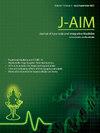分子洞察选定的印度草药抗炎活性
IF 1.9
Q3 INTEGRATIVE & COMPLEMENTARY MEDICINE
引用次数: 0
摘要
炎症是哺乳动物组织对伤害的一种普遍反应,包括对损伤、病原体和外来颗粒的反应。慢性炎症通常出现在过敏和自身免疫性疾病中,会带来重大风险,可能导致类风湿关节炎、阿尔茨海默病、哮喘和炎症性肠病等疾病。它也可能是癌症的常见前兆。然而,像非甾体抗炎药和皮质类固醇这样的当代治疗方法往往不能完全缓解慢性炎症,并且具有明显的副作用,这强调了探索传统和植物性药物以获得新的有效治疗方法的必要性。因此,人们对维持健康和减少疾病风险的天然生物活性物质的需求日益增长。长期用于治疗炎症和其他疾病的传统药物和基于植物的药物有望发现生物活性先导化合物,并随后开发用于治疗炎症疾病的药物。这篇综述包括对选定的传统印度草药的抗炎潜力和相关的药理作用机制的广泛研究。炎症过程通常涉及转录因子的激活、各种信号级联反应的诱导、基因表达、炎症酶的激活以及促炎细胞因子在炎症细胞或免疫细胞中的释放。对印度楝树(Azadirachta indica)、古古Salai (Boswellia serrata)、绿茶(Camellia sinensis)、藏红花(Crocus sativus)、姜黄(Curcuma longa)、山竹(Garcinia mangostana)、印度桑葚(Morinda citrifolia)、黑孜然(Nigella sativa)、Ashwagandha (Withania somnifera)和生姜(Zingiber officinale)等传统草药中有效成分的详细研究揭示了它们潜在的抗炎特性。对这些植物的深入研究为它们在治疗炎症性疾病方面的潜在应用提供了见解。需要进一步的研究和开发来证实这些发现并将其转化为临床有效的治疗方法。本文章由计算机程序翻译,如有差异,请以英文原文为准。
Molecular insights into anti-inflammatory activities of selected Indian herbs
Inflammation is a universal response of mammalian tissue to harm, comprising reactions to injuries, pathogens, and foreign particles. Chronic inflammation, often present in allergies and autoimmune disorders, poses significant risks, potentially leading to conditions such as rheumatoid arthritis, Alzheimer's disease, asthma, and inflammatory bowel disease. It can also be a common precursor to cancer. However, Contemporary therapies like NSAIDs and corticosteroids often provide incomplete relief from chronic inflammation and carry significant side effects, underscoring the need for exploring traditional and plant-based medicines for new, effective treatments. As such, there is a growing demand for natural bioactive substances for health maintenance and disease risk reduction. Traditional and plant-based medicines, long-used in managing inflammation and other disorders, hold promise for the discovery of bioactive lead compounds and subsequent drug development for treating inflammatory disorders. This review encompasses an extensive study of the anti-inflammatory potential of selected traditional Indian herbal medicines and the associated pharmacological mechanisms of action. The inflammatory process often entails the activation of transcription factors, induction of various signaling cascades, gene expression, activation of inflammatory enzymes, and release of pro-inflammatory cytokines in inflammatory or immune cells. Detailed exploration of active components in traditional herbal medicines such as the Neem (Azadirachta indica), Salai guggul (Boswellia serrata), Green tea (Camellia sinensis), Saffron (Crocus sativus), Turmeric (Curcuma longa), Mangosteen (Garcinia mangostana), Indian mulberry (Morinda citrifolia), Black cumin (Nigella sativa), Ashwagandha (Withania somnifera), and Ginger (Zingiber officinale) reveals their potential anti-inflammatory properties. The in-depth study of these plants provides insight into their potential applications in managing inflammatory disorders. Further research and development are necessary to substantiate these findings and translate them into clinically effective therapeutics.
求助全文
通过发布文献求助,成功后即可免费获取论文全文。
去求助
来源期刊

Journal of Ayurveda and Integrative Medicine
INTEGRATIVE & COMPLEMENTARY MEDICINE-
CiteScore
4.70
自引率
12.50%
发文量
136
审稿时长
30 weeks
 求助内容:
求助内容: 应助结果提醒方式:
应助结果提醒方式:


